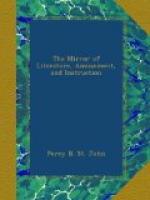“When I first saw this eminent person, he gave me the idea of a French Virgil: not that he is like a Frenchman, much less the French translator of Virgil. I found him as handsome as the Abbe Delille is said to have been ugly. But he seemed to me to embody a Frenchman’s ideal notion of the Latin poet; something a little more cut and dry than I had looked for; compact and elegant, critical and acute, with a consciousness of authorship upon him; a taste over-anxious not to commit itself, and refining and diminishing nature as in a drawing-room mirror. This fancy was strengthened in the course of conversation, by his expatiating on the greatness of Racine. I think he had a volume of the French Tragedian in his hand. His skull was sharply cut and fine; with plenty, according to the phrenologists, both of the reflective and amative organs; and his poetry will bear them out. For a lettered solitude and a bridal properly got up, both according to law and luxury, commend us to the lovely Gertrude of Wyoming. His face and person were rather on a small scale; his features regular; his eye lively and penetrating; and when he spoke, dimples played about his mouth, which nevertheless had something restrained and close in it. Some gentle puritan seemed to have crossed the breed, and to have left a stamp on his face, such as we often see in the female Scotch face rather than the male. But he appeared not at all grateful for this; and when his critiques and his Virgilianism were over, very unlike a puritan he talked! He seemed to spite his restrictions; and out of the natural largeness of his sympathy with things high and low, to break at once out of Delille’s Virgil into Cotton’s, like a boy let loose from school. When I have the pleasure of hearing him now, I forget his Virgilianisms, and think only of the delightful companion, the unaffected philanthropist, and the creator of a beauty worth all the heroines in Racine.
“Mr. Campbell has tasted pretty sharply of the good and ill of the present state of society, and for a book-man has beheld strange sights. He witnessed a battle in Germany from the top of a convent (on which battle he has written a noble ode); and he saw the French cavalry enter a town, wiping their bloody swords on the horses’ manes. Not long ago he was in Germany again, I believe to purchase books; for in addition to his classical scholarship, and his other languages, he is a reader of German. The readers there, among whom he is popular, both for his poetry and his love of freedom, crowded about




